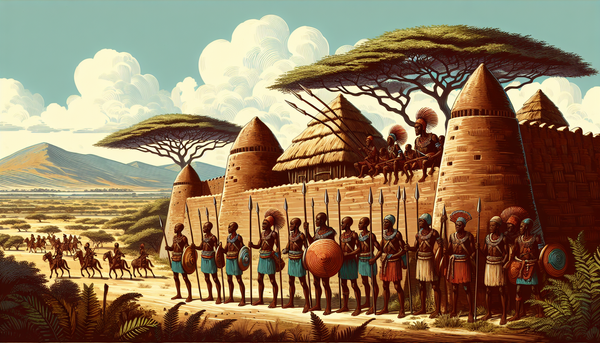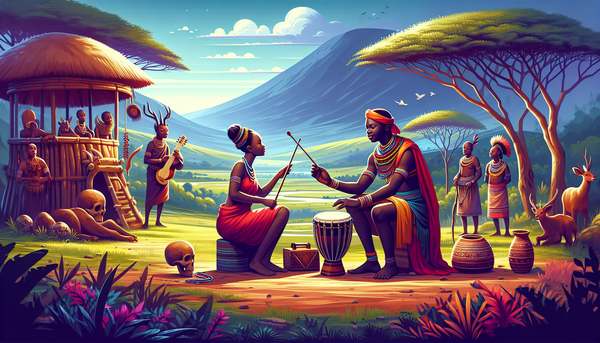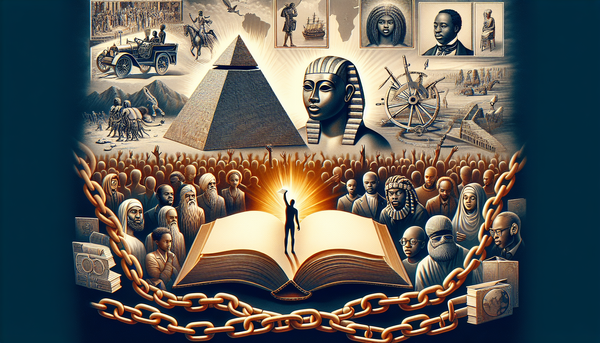Shaka Zulu and the Evolution of South Africa's Historical Landscape

Introduction to Shaka Zulu: The Man, The Myth, The Legacy
Shaka Zulu stands as a towering figure in the history of southern Africa, revered for his military prowess, political cunning, and cultural influence. Born in the early 19th century, Shaka rose to prominence as the ruler of the Zulu Kingdom, leaving an indelible mark on the region's historical landscape through his innovative leadership and visionary strategies.
Known for his strategic military innovations, Shaka revolutionized warfare in southern Africa by introducing new combat tactics, weaponry, and organization techniques that enabled the Zulu forces to achieve remarkable success on the battlefield. His emphasis on discipline, speed, and agility transformed the Zulu army into a formidable fighting force that challenged and defeated rival tribes and European colonizers alike.
Beyond his military achievements, Shaka's legacy also extends to the realm of culture and identity. Under his rule, the Zulu Kingdom experienced a period of cultural unification and societal reorganization, with Shaka promoting a sense of shared heritage and tradition among his subjects. His efforts to centralize authority, standardize customs, and instill a sense of national pride helped to forge a cohesive Zulu identity that transcended tribal divisions and fostered a spirit of unity among diverse communities.
Shaka's enduring legacy as a visionary leader, strategic genius, and cultural icon continues to captivate the imagination of scholars, artists, and storytellers, shaping perceptions of history and identity in South Africa and beyond. As we delve into the life and impact of Shaka Zulu, we uncover a complex tapestry of myth, legend, and historical reality that illuminates the transformative power of one man's legacy on the evolution of a nation.
Shaka's Military Genius: Innovations that Changed Warfare
Shaka Zulu's military innovations revolutionized the art of war in southern Africa, marking him as one of the most brilliant military strategists in history. His visionary tactics and organizational reforms transformed the Zulu army into a formidable fighting force that conquered vast territories and established the Zulu Kingdom as a dominant power in the region.
One of Shaka's most significant military innovations was the introduction of the iklwa, a short stabbing spear that revolutionized close combat and increased the lethality of Zulu warriors on the battlefield. The iklwa, combined with Shaka's emphasis on speed, agility, and surprise attacks, gave the Zulu army a decisive edge over their adversaries, allowing them to achieve swift and decisive victories in battle.
Shaka also implemented groundbreaking changes in military organization and training, instituting a system of disciplined ranks, formations, and tactics that maximized the effectiveness of Zulu warriors in combat. By organizing his troops into specialized regiments based on age and skill level, Shaka was able to coordinate complex maneuvers and strategic assaults that outmaneuvered and overwhelmed enemy forces.
Furthermore, Shaka's use of psychological warfare, such as intimidating battle cries and strategic feints, instilled fear and confusion in his enemies, further tilting the odds in favor of the Zulu army. His ability to exploit terrain, leverage intelligence, and adapt tactics to specific battlefield conditions showcased his tactical acumen and strategic foresight, setting a new standard for military excellence in southern Africa.
Shaka's military genius not only transformed the Zulu army into a formidable fighting force but also left a lasting legacy on the evolution of warfare, influencing tactics, weaponry, and military organization in the region for generations to come. His innovations continue to be studied and admired by military historians and strategists worldwide, attesting to the enduring impact of his visionary leadership and revolutionary approach to warfare.
Cultural Unification and Identity under Shaka's Rule
Shaka Zulu's reign as the leader of the Zulu Kingdom was not only marked by military conquests and territorial expansion but also by a concerted effort to unify diverse communities and foster a sense of shared identity among his subjects. Through his policies and reforms, Shaka sought to create a cohesive Zulu nation built on a foundation of common heritage, customs, and values.
One of the key aspects of Shaka's cultural unification efforts was his promotion of a standardized Zulu language, dress, and social practices across the kingdom. By establishing a common language and cultural norms, Shaka aimed to bridge tribal divisions and create a sense of unity among different ethnic groups under Zulu rule. This cultural homogenization helped to strengthen social cohesion and facilitate communication and cooperation among various communities within the kingdom.
Shaka also implemented administrative reforms that centralized authority and promoted a sense of collective identity among his subjects. By establishing a system of governance that emphasized loyalty and obedience to the Zulu monarch, Shaka instilled a sense of shared responsibility and common purpose among his people, fostering a spirit of nationalism and allegiance to the Zulu Kingdom.
Moreover, Shaka's emphasis on military discipline, bravery, and honor as core values of the Zulu ethos further reinforced a sense of cultural pride and identity among his warriors and subjects. By upholding these values as the pillars of Zulu society, Shaka solidified the kingdom's cultural identity and instilled a sense of collective purpose and solidarity among the Zulu people.
Overall, Shaka's efforts to promote cultural unification and identity under his rule played a crucial role in shaping the social fabric of the Zulu Kingdom and laying the foundation for a cohesive, resilient society united by a shared heritage and sense of belonging. His legacy as a cultural unifier and nation-builder continues to resonate in the hearts and minds of the Zulu people, highlighting the enduring impact of his visionary leadership and commitment to fostering a strong, vibrant cultural identity.
Encounters with Colonial Forces: Conflict and Cooperation
The arrival of colonial forces in southern Africa during Shaka Zulu's reign posed a complex challenge to the Zulu Kingdom, leading to a series of conflicts and alliances that reshaped the political landscape of the region. As European powers sought to expand their influence and control over African territories, the Zulu Kingdom found itself caught in a delicate balance between resistance and cooperation with colonial forces.
Initially, the Zulu army, under Shaka's leadership, effectively resisted European incursions into Zulu territories, employing their superior military tactics and knowledge of the terrain to fend off colonial advances. However, as European powers continued to expand their colonial presence in southern Africa, the Zulu Kingdom faced increasing pressure and threats from external forces, forcing Shaka and his successors to navigate a complex web of diplomatic relations and military engagements with colonial powers.
Despite clashes and skirmishes with colonial forces, there were also instances of cooperation and strategic alliances between the Zulu Kingdom and European settlers, particularly during times of mutual benefit or shared interests. Trade agreements, diplomatic negotiations, and military alliances were established between the Zulu leadership and European colonizers, leading to moments of cooperation and collaboration that shaped the dynamics of colonial encounters in the region.
The interactions between the Zulu Kingdom and colonial forces during this period were marked by a complex interplay of conflict, negotiation, and adaptation, as both sides sought to protect their interests and assert their authority in a rapidly changing political landscape. The encounters with colonial forces tested the resilience and diplomatic skills of the Zulu leadership, highlighting the challenges and opportunities presented by the arrival of European powers in southern Africa and the complexities of navigating colonial encounters in a shifting geopolitical environment.
Expansion of the Zulu Kingdom: Territory and Power
Under the leadership of Shaka Zulu, the Zulu Kingdom experienced a remarkable period of territorial expansion and consolidation, extending its influence and power across vast swaths of southern Africa. Through a combination of military conquests, strategic alliances, and administrative reforms, Shaka and his successors transformed the Zulu Kingdom into a formidable regional power that dominated the political landscape of the region.
Shaka's military campaigns were instrumental in expanding the boundaries of the Zulu Kingdom, as he led his armies on a series of successful campaigns that conquered neighboring tribes, unified disparate communities, and integrated new territories into the Zulu domain. Through a combination of superior military tactics, disciplined warriors, and innovative strategies, Shaka was able to rapidly expand the Zulu Kingdom's territorial reach and assert its dominance over rival chieftains and kingdoms in the region.
In addition to military conquests, the Zulu Kingdom's expansion was also facilitated by strategic alliances and diplomatic maneuvers that allowed the Zulu leadership to forge beneficial relationships with neighboring tribes and communities. By leveraging political marriages, trade agreements, and mutual defense pacts, the Zulu Kingdom extended its sphere of influence and consolidated power over a diverse array of territories and populations.
As the Zulu Kingdom expanded its territory and consolidated its power, the administrative reforms instituted by Shaka and subsequent rulers played a crucial role in maintaining cohesion and stability within the kingdom. Centralized authority, standardized governance structures, and efficient communication networks helped to govern the vast Zulu territories and ensure a uniform system of rule across the kingdom.
Overall, the expansion of the Zulu Kingdom under Shaka's rule was a testament to his visionary leadership, military prowess, and diplomatic acumen, solidifying the kingdom's status as a major political and military power in southern Africa and laying the foundation for its enduring legacy in the region's historical landscape.
Shaka's Modern Influence in South African Society
Shaka Zulu's legacy continues to exert a profound influence on modern South African society, shaping cultural identity, historical narratives, and political discourse in the region. As one of the most iconic figures in southern African history, Shaka's impact transcends time and borders, leaving a lasting imprint on the collective consciousness of the nation and its people.
In contemporary South Africa, Shaka is celebrated as a symbol of resilience, courage, and leadership, embodying the spirit of resistance against oppression and colonial domination. His military genius, cultural unification efforts, and visionary reforms have inspired generations of South Africans to reclaim their heritage, assert their identity, and uphold the values of unity and pride that defined the Zulu Kingdom under his rule.
Moreover, Shaka's influence is evident in various aspects of South African popular culture, from literature and art to music and film, where his legacy is celebrated and reimagined in diverse creative expressions. His larger-than-life persona and legendary exploits are frequently depicted in novels, plays, and television series, capturing the imagination of audiences and shaping popular perceptions of history and heroism in South Africa.
Politically, Shaka's legacy serves as a potent symbol of resistance and empowerment for marginalized communities, reminding South Africans of the ongoing struggle for justice, equality, and self-determination in a post-apartheid society. His legacy is invoked in debates around land rights, cultural heritage, and national identity, highlighting the enduring relevance of his ideals and principles in contemporary political discourse.
In essence, Shaka Zulu's modern influence in South African society underscores his timeless significance as a cultural icon, historical figure, and symbol of national unity, inspiring South Africans to embrace their heritage, honor their ancestors, and forge a collective identity rooted in the rich tapestry of their shared history.
Reflections: Assessing the Impact of Shaka on Today's South Africa
In contemporary South Africa, the legacy of Shaka Zulu continues to reverberate through the nation's cultural, social, and political landscape, shaping perceptions, attitudes, and aspirations in profound ways. As one of the most iconic figures in South African history, Shaka's impact on modern-day South Africa can be seen through a multifaceted lens that encompasses historical memory, cultural identity, and national pride.
Shaka's influence on today's South Africa is perhaps most tangible in the realm of cultural identity, as his legacy serves as a powerful symbol of resilience, unity, and heritage for many South Africans. The ideals of strength, courage, and leadership that Shaka embodied during his reign resonate with contemporary notions of self-determination, empowerment, and cultural pride, inspiring individuals to celebrate their African heritage and embrace the legacy of past leaders like Shaka.
Moreover, Shaka's impact on today's South Africa can also be felt in the realm of historical memory and national narratives, as his story is often invoked to remind South Africans of the struggles and triumphs of the past. By engaging with Shaka's legacy, South Africans confront complex historical legacies, grapple with questions of identity and belonging, and seek to reconcile the contradictions and complexities of their shared history.
Politically, Shaka's influence on today's South Africa underscores the enduring relevance of his leadership, vision, and principles in contemporary discourse around governance, empowerment, and social justice. His commitment to unity, strategic thinking, and cultural unification continues to inspire South Africans to strive for a more inclusive, equitable society that honors the diversity and resilience of its people.
In conclusion, the impact of Shaka Zulu on today's South Africa is a testament to his enduring legacy as a cultural icon, historical figure, and symbol of national unity. By reflecting on Shaka's influence in modern-day South Africa, individuals are able to connect with their heritage, embrace their cultural identity, and draw strength from the legacy of one of the nation's most legendary leaders.



